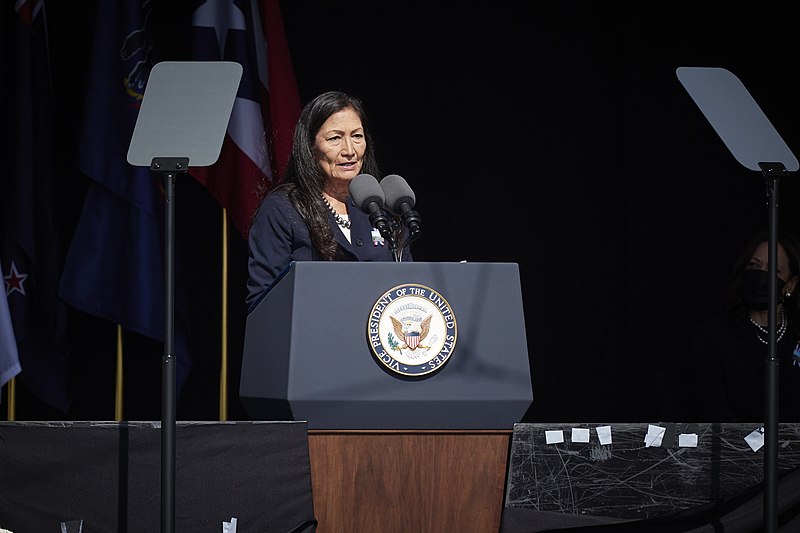US Interior Secretary Deb Haaland is moving through the final steps to remove a word considered a slur against Indigenous women from federal lands. The department is set to ban the word “squaw” from federal lands following an assessment by the task force in charge of reviewing land names.
AFP reports that Haaland, who is the first Native American to become Interior Secretary, is finalizing steps to remove the word “squaw” from all federal lands. This follows a report by the derogatory geographic names task force that looked through over 660 geographic features in the country that have the slur which the federal government currently refers to as “sq___.”
The effort was first announced back in February when the agency started a comment period and reviewed possible replacement names. The names of several towns were also under review, such as Squaw Harbor in Alaska, according to the release by the department.
The word “squaw” is part of the Algonquian languages of North America, meaning “woman.” However, the word has taken on an offensive tone as it was used as a slur by White people during the colonization of the Americas. The word was commonly used to objectify Native women.
Haaland thanked the task force for their “work to ensure that racist names like sq___ no longer have a place on our federal lands.” Haaland also said she hoped to implement the changes as soon as possible after a vote by the US Board on geographic names.
However, there are other Native Americans who are attempting to reclaim the word in its original meaning.
Earlier this month, Haaland defended the Biden administration’s progress regarding federal fossil fuel leasing during a hearing of the Senate Appropriations Committee, citing the unused leases on federal lands.
This follows the executive order signed by President Joe Biden in January 2021 to temporarily pause new oil and gas leasing on federal lands.
Gas prices have increased this year due to a number of factors, including the war in Ukraine along with production that is struggling to keep up with the demand. The administration has cited the unused leases to address the criticism of its energy policies.



 Jack Lang Resigns as Head of Arab World Institute Amid Epstein Controversy
Jack Lang Resigns as Head of Arab World Institute Amid Epstein Controversy  Trump Signs “America First Arms Transfer Strategy” to Prioritize U.S. Weapons Sales
Trump Signs “America First Arms Transfer Strategy” to Prioritize U.S. Weapons Sales  South Korea Assures U.S. on Trade Deal Commitments Amid Tariff Concerns
South Korea Assures U.S. on Trade Deal Commitments Amid Tariff Concerns  Iran–U.S. Nuclear Talks in Oman Face Major Hurdles Amid Rising Regional Tensions
Iran–U.S. Nuclear Talks in Oman Face Major Hurdles Amid Rising Regional Tensions  US Pushes Ukraine-Russia Peace Talks Before Summer Amid Escalating Attacks
US Pushes Ukraine-Russia Peace Talks Before Summer Amid Escalating Attacks  U.S. Lawmakers to Review Unredacted Jeffrey Epstein DOJ Files Starting Monday
U.S. Lawmakers to Review Unredacted Jeffrey Epstein DOJ Files Starting Monday  Trump Says “Very Good Talks” Underway on Russia-Ukraine War as Peace Efforts Continue
Trump Says “Very Good Talks” Underway on Russia-Ukraine War as Peace Efforts Continue  China Warns US Arms Sales to Taiwan Could Disrupt Trump’s Planned Visit
China Warns US Arms Sales to Taiwan Could Disrupt Trump’s Planned Visit  India–U.S. Interim Trade Pact Cuts Auto Tariffs but Leaves Tesla Out
India–U.S. Interim Trade Pact Cuts Auto Tariffs but Leaves Tesla Out  Federal Judge Restores Funding for Gateway Rail Tunnel Project
Federal Judge Restores Funding for Gateway Rail Tunnel Project  Netanyahu to Meet Trump in Washington as Iran Nuclear Talks Intensify
Netanyahu to Meet Trump in Washington as Iran Nuclear Talks Intensify  Trump Signs Executive Order Threatening 25% Tariffs on Countries Trading With Iran
Trump Signs Executive Order Threatening 25% Tariffs on Countries Trading With Iran  U.S. Announces Additional $6 Million in Humanitarian Aid to Cuba Amid Oil Sanctions and Fuel Shortages
U.S. Announces Additional $6 Million in Humanitarian Aid to Cuba Amid Oil Sanctions and Fuel Shortages  Trump Allows Commercial Fishing in Protected New England Waters
Trump Allows Commercial Fishing in Protected New England Waters  TrumpRx Website Launches to Offer Discounted Prescription Drugs for Cash-Paying Americans
TrumpRx Website Launches to Offer Discounted Prescription Drugs for Cash-Paying Americans  Nighttime Shelling Causes Serious Damage in Russia’s Belgorod Region Near Ukraine Border
Nighttime Shelling Causes Serious Damage in Russia’s Belgorod Region Near Ukraine Border  Japan Election 2026: Sanae Takaichi Poised for Landslide Win Despite Record Snowfall
Japan Election 2026: Sanae Takaichi Poised for Landslide Win Despite Record Snowfall 































